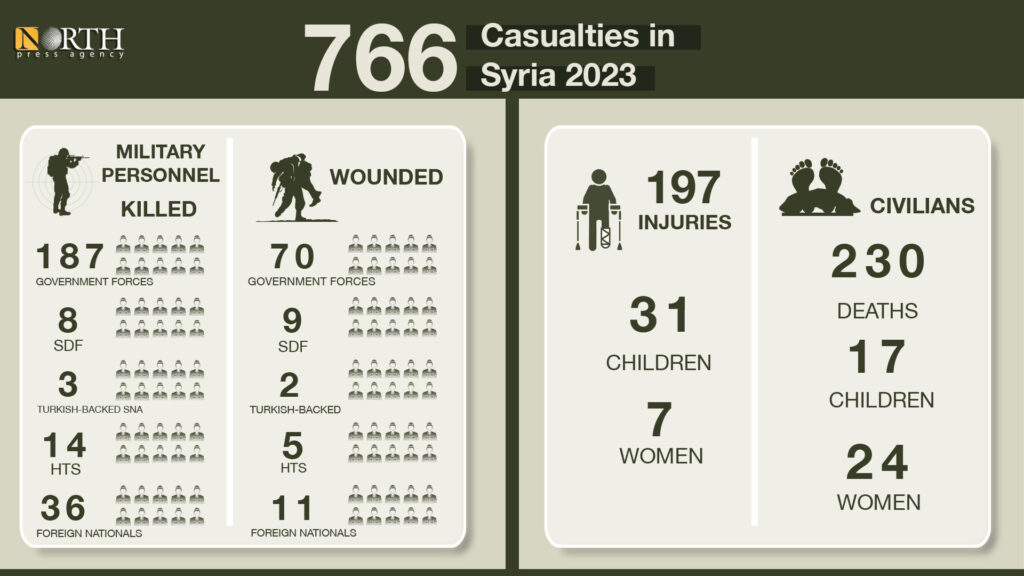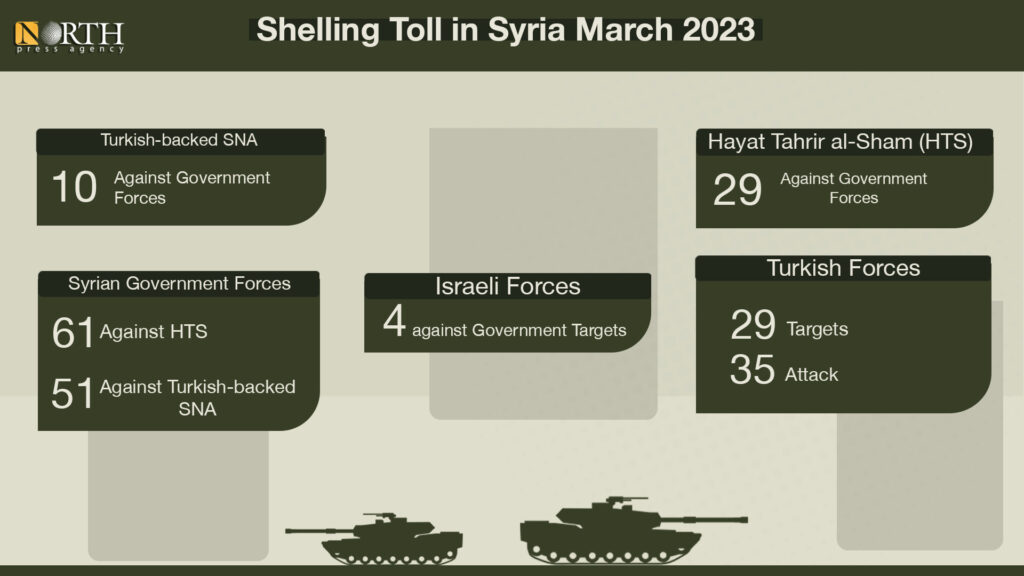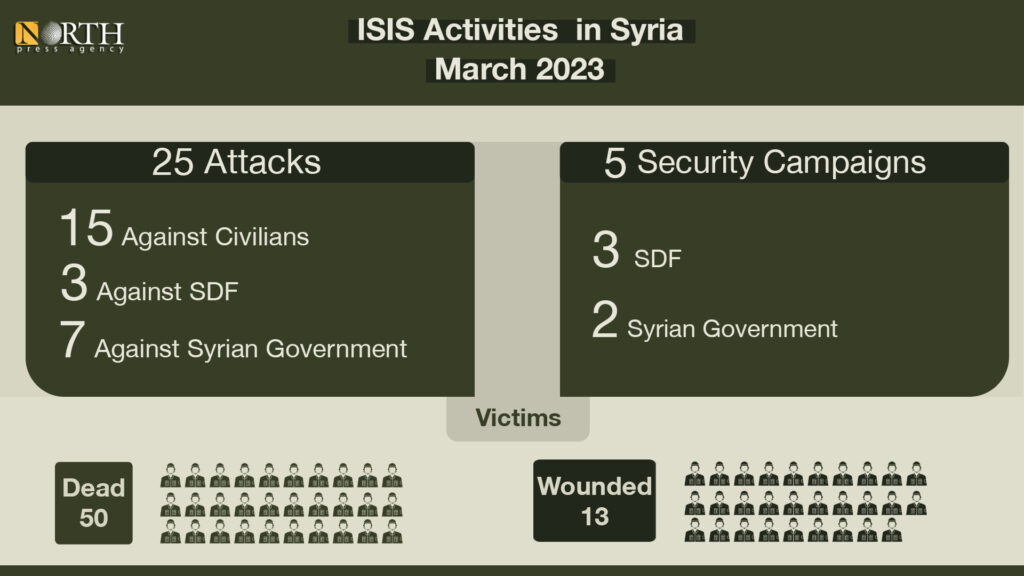Introduction
Hostilities escalated against civilians, and so did the intensity of the shelling between conflicting parties in Syria in March. Clashes also increased between foreign powers in Syria. Since the beginning of 2023, the highest death toll was recorded in March and was caused by the remnants of war.
Over a month after the devastating February 6 earthquake, thousands of affected people remain homeless without tents and relief aid. In addition to the earthquake, hundreds of tents and houses were damaged by storms and floods that hit the country, aggravating the IDPs’ crises.
On the Humanitarian and livelihood level, the situation is changing from bad to worse. Each month that passes, violations intensify against civilian Syrians, adding more economic burdens which impact all of their rights.
This monthly report of the Monitoring and Documentation Department of North Press sheds light on the most prominent human rights violations recorded and documented during March based on the information obtained from a network of field sources across Syria.
The report includes casualties of human rights violations such as killing, kidnapping, and arbitrary arrests committed by the conflicting parties, in addition to statistics of victims who lost their lives to remnants of war purposefully planted by some parties on the outskirts of their control areas for their protection but causing the death of dozens of monthly civilian victims.
The report views the indiscriminate shelling by controlling forces, its repercussions, and its effects on civilians and public property, as well as ISIS activity. Furthermore, it shows the continuously deteriorating crises and their impact on the humanitarian situation, in addition to issues that concern Syrians and undermine their security and stability during this month.
Victims
The number of violations’ victims in Syria increased by 52 percent in March compared to February due to the recent escalation between parties of the conflict.
The Monitoring and Documentation Department recorded until March 30, 766 victims, including 472 deaths and 294 injuries by direct targeting or unlawful indiscriminate shelling or by torture and physical abuse and other inhumane treatments. All civilians were extra-judicially killed by conflicting parties or because of the expanding phenomenon of civilian armament. The numbers visible in the report are a part of the public statistic.
The number of civilian casualties reached 427, of which 230 were killed, including 17 children and 24 women, whereas 197 others were wounded, including 31 children and seven women. The highest number of civilian victims was recorded in Deir ez-Zor Governorate, with 162 people, followed by 59 in Hama Governorate, 46 in Daraa, and 45 in Aleppo.
As for military casualties in March, 248 were killed, and 97 were wounded. The casualties were in the four controlling powers in Syria, 187 dead and 70 injured among the government forces. From Turkish-backed opposition factions, also known as the Syrian National Army (SNA), three were killed and two injured. As for the Hayat Tahrir al-Sham (HTS, formerly al-Nusra Front), 14 dead and five wounded were recorded in addition to the death of 36 and the injury of 11 among non-Syrian nationalities. The death of eight fighters and the injury of nine others was recorded among the Syrian Democratic Forces (SDF).
Victims of war remnants reached 20 percent of the statistic, the highest since the beginning of 2023. The number of casualties reached 155 individuals, where ten children died and 14 others were wounded, and seven women died. Also, 51 men died and 47 were injured. Among the military personnel, 19 were killed, and seven were injured.

The indiscriminate shelling in March was at its highest since the beginning of 2023. There were 43 attacks against government-held areas, the HTS conducted 29 of which with a total of 106 strikes, Israel conducted four attacks with 12 strikes, and the SNA launched ten attacks with 15 strikes. On the other hand, the government forces targeted the HTS-held areas 61 times with 79 strikes and 15 positions of the opposition factions in the north of Aleppo with 26 strikes.
Turkey persists in its illegal attacks against border areas under the pretext of fighting “terrorism.” The Turkish forces bombed 29 positions with 35 strikes causing the death of two SDF fighters and the injury of one civilian.

The parties of the conflict continue to commit arbitrary arrests. In March, 120 individuals were arrested in various areas in Syria, of which 23 people, the majority being opponents, were taken by the HTS. The SNA arrested 23 people under the charge of participating in Jindires protests, raising the flag of Kurdistan Region of Iraq, or complicity with the Autonomous Administration of North and East Syria (AANES). In the AANES-held areas, 12 individuals were arrested for illegal smuggling or joining ISIS. The government forces arrested 49 people, including three women and a child, under various charges, while others were arrested without direct accusations. The Iran-backed militias apprehended 19 people under charges of espionage.
ISIS Activity
In March, ISIS killed 81 people and injured 25 others by targeting them directly or through planted landmines. Most of its victims were civilians.
The intensity of ISIS’ attacks increased by 38 percent compared to February. ISIS conducted 25 assaults, including 15 against civilians, three against the SDF, and seven against the government forces. 11 attacks were launched in Deir ez-Zor, seven in Hama, four in Homs, and one in each Hasakah, Raqqa, and Aleppo.
The casualties decreased by 20 percent in March compared to February. The number of victims reached 63, including 50 dead and 13 wounded. The group also caused the death of 31 individuals and the injury of 12 by randomly planting landmines on the roads and lands.
The SDF carried out three security operations in which they arrested six individuals suspected of joining ISIS. The government forces conducted two security operations killing two ISIS suspects. The number of security operations is the lowest since the beginning of 2023.

Turkish forces, SNA factions’ violations against Syrians
The Turkish-backed SNA factions have not ceased committing systematic violations and inhuman crimes against residents living in areas under their control. In March, the factions killed five people and injured 11 others, including three children. They also arrested 23 people in Afrin on charges of participating in protests and raising the flag of the Kurdistan Region of Iraq.
This statistic is the lowest in 2023 due to popular discontent and protests in SNA-held areas, in which residents demanded their expulsion from Afrin following the killing of five people and the injury of another on the eve of Newroz by Ahrar al-sharqiya faction, which occurred when the victims refused to extinguish the fire they set in front of their house in the celebration of Newroz.
The toll of the victims is low compared to the first two months of 2023. Since the factions were pressured by world countries that condemned the crime and demanded that the perpetrators be punished, they stopped killing but began arbitrarily arresting 14 protestors.
The SNA claimed that the perpetrators did not belong to any of their factions. They announced the arrest of four individuals claiming they were IDPs. On the other hand, the locals and eyewitnesses stressed the perpetrators were from the Ahrar al-Sharqiya and accused Hassan al-Dabaa, aka Abu Hamza al-Khasham, and Ali Khalaf, aka Abu Habib al-Khasham, and that they were not detained.
The Turkish forces continue to indiscriminately bomb regions of north and east Syria and directly attack asylum seekers.
They have caused the death of nine people and the injury of 23 others, whether through direct attack or by shelling. The Turkish forces targeted 29 positions in north and east Syria with 35 strikes, mostly civilian locations, killing two individuals and wounding two others.
The Turkish border guards persist in their violations against asylum seekers who try to cross the Syrian-Turkish border. The attacks killed seven people and injured 21 through direct targeting. They also assaulted 60 people and arrested 18 others.
The protest broke out in areas held by the SNA against the violations of the Turkish border guards following the killing of one man and the injury of seven others who were subjected to physical abuse and torture.
Prominent actions, international reports related to Syria
In March, several human rights and political reports and data were issued related to the humanitarian situation and the Syrian crisis.
On March 28, the US and UK imposed sanctions on Syrian figures involved in the captagon trade. The sanctions include two entities and six individuals; among them are family members of Bashar al-Assad and leaders in opposition factions.
According to the US Department of the Treasury, Syria has become a pioneer in the captagon trade as it contributes to funding the Syrian government and enables the ruling regime to continue repressing the Syrian people.
On March 23, Human Rights Watch (HRW) released a report following the Jindires crime, titled “Syria: Turkey-Backed Fighters Kill 4 Kurdish Civilians,” demanding a transparent and independent investigation to identify the perpetrator and punish them. Turkey was accused of being complicit in these violations as it allowed the opposition factions to assault the locals in areas under its control with impunity. The report said, “As an occupying power and as a backer of the local factions operating in areas under its control in northern Syria, Turkey is obliged to investigate these killings and ensure that those responsible are held accountable. Turkey should also cut all support to SNA factions implicated in recurrent or systemic human rights abuses and international humanitarian law violations.”
On March 14, the World Food Program (WFP) released a report on Syria, saying that around 12.1 million people in Syria are food insecure, and 2.9 others are at risk of sliding into hunger. The report noted that the malnutrition rates increased by 25 percent in northeastern Syria.
On March 13, the Commission of Inquiry on Syria issued a report highlighting several issues, including the failure of the Syrian government, parties of the conflict, the international community, and the United Nations in delivering aid to quake-affected people. According to the committee, Daraa, Suwyada, and Hama witness insecurity, continuing arbitrary imprisonment, torture, ill-treatment, and enforced disappearances. Violations of property rights included seizures, auctions, and prohibitions on access to the property.
The committee noted in the report that “HTS in Idlib and SNA factions in western Aleppo tortured and arbitrarily detained people, including in a manner tantamount to enforced disappearance. Fundamental freedoms remained curtailed and critical voices were silenced in these areas. The Commission is investigating credible and multiple reports that HTS carried out executions by firing squad. In the areas controlled by the SNA, the Commission documented hostage-taking, pillage, and property confiscation.”

